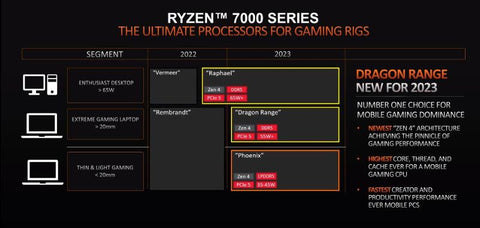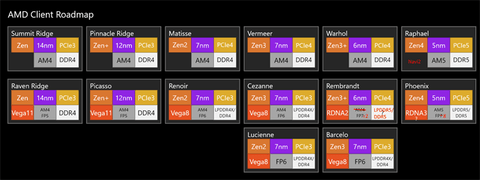AMD’s remarkable rise in recent times means it’s now one of the leading element manufacturers worldwide. important of the growth has been led by its Ryzen CPUs, which have proven to be further than a match for Intel.
As a result, there’s plenitude of excitement girding the new Ryzen 7000 Series, especially now AMD has officially revealed the first CPUs in the lineup. They ’ll only be available for desktop PCs originally, but that that wo n’t remain the case for long. Then’s everything you need to know.
AMD Ryzen 7000 Series release date
At AMD’s CES keynote in January 2022, the company confirmed that the Ryzen 7000 Series was on the way. It even committed to a rough release window – the second half of 2022 – before stating that the Ryzen 7000 Series was on schedule for release sometime in Q3 2022.
That’s earlier than we’d usually expect new AMD processors, but it turned out to be true. At an event on 29 August, the company officially revealed the first four CPUs in the Ryzen 7000 Series range – here’s how to watch back the event if you missed it. As desktop chips, they’ll all be available to buy from 27 September.
However, don’t expect any more new CPUs until 2023. That’s what an earlier official roadmap suggested, with laptop processors expected to be the main focus. In a blog post announcing its new naming scheme for CPUs, AMD all but confirmed that no more processors will be announced until 2023.
The first of these are expected at CES 2023 in January, but look out for more at various points throughout the year.

Image: AMD
That extreme “Dragon Range” category mentioned above is a new entry compared to the Ryzen 6000 Series. Expect to find them in high-end gaming laptops that are released throughout 2023.
AMD Ryzen 7000 Series pricing
Alongside the announcement of the first four Ryzen 7000 Series desktop CPUs, AMD also revealed suggested pricing based on USD as they're released their first.
- Ryzen 9 7950X – $699
- Ryzen 9 7900X – $549
- Ryzen 7 7700X – $399
- Ryzen 5 7600X – $299
Remember, that’s probably not what you’ll end up paying. Individual retailers can choose how much to sell the processors for, so there’s likely to be some variation. However, it does suggest at least some of the CPUs will be cheaper than the previous-gen Ryzen 5000 Series:
- Ryzen 9 5950X – $799
- Ryzen 9 5900X – $549
- Ryzen 7 5800X – $449
- Ryzen 5 5600X – $299
These prices represent a £50 increase on the Ryzen 4000 series. There’s a chance you’ll be expected to pay even more for the next generation, given a new architecture and manufacturing process are being used. Wccftech suggests there’ll be five new CPUs initially this time, but that the approximate suggested pricing may be lower:
- Ryzen 9 7950X – $700
- Ryzen 9 7900X – $600
- Ryzen 7 7800X – $400
- Ryzen 7 7700X – $300
- Ryzen 5 7600X – $200
Laptop-focused mobile CPUs are expected at some point, although they’re designed to be integrated into devices and not available as standalone components. How much you pay will therefore depend on many other factors, including the other key specs and the brand in question.
AMD Ryzen 7000 Series specs and features
AMD revealed several key Ryzen 7000 Series specs ahead of time, but we still learned plenty more at the event on 29 August. The new CPUs shift to a 5nm process and adopt the Zen 4 architecture that launched alongside them, which AMD claims takes “gaming and content creation performance leadership to new levels”.
You also get the latest PCIe Gen 5 and DDR5 memory (DDR4 has been dropped) across all four of the CPUs that have been revealed so far:
- Ryzen 9 7950X – 16 cores, 32 threads, 5.7GHz max clock speed, 80Mb cache, 170W TDP
- Ryzen 9 7900X – 12 cores, 24 threads, 5.6GHz max clock speed, 76Mb cache, 170W TDP
- Ryzen 7 7700X – 8 cores, 16 threads, 5.4GHz max clock speed, 40Mb cache, 105W TDP
- Ryzen 5 7600X – 6 cores, 12 threads, 5.3GHz max clock speed, 38Mb cache, 105W TDP
As you might expect, AMD claims the Ryzen 7000 Series delivers significant performance gains compared to its predecessor. According to internal testing, the top-spec Ryzen 9 7950X delivers up to 57% better performance for content creation compared to Intel’s latest Core i9-12900K. Even the most affordable Ryzen 5 7600X supposedly delivers 5% better performance for gaming than the top-spec Intel CPUs. However, it remains to be seen how well that translates to real-world usage.
But arguably the more significant claimed improvements comes to power efficiency. Despite not adopting the hybrid architecture of Intel CPUs, the 7950X is supposedly up to 47% more power-efficient than the i9-12900K. That should help reduce throttling and manage thermals more effectively on desktop machines, but could yield a big battery life improvement on laptops.
Inside the Ryzen 7000 chipset you’ll find three chiplets; two 5nm Zen 4 CPU modules and a new 6nm I/O die with integrated RDNA 2 graphics, along with DDR5 and PCIe 5.0 controllers and built-in power management. This means every chip will have some kind of graphical power, with a separate graphics card only necessary for gaming or other very demanding workloads.
Previously, a short clip from the CES 2022 keynote was posted to the official AMD Ryzen Twitter account. This highlights the gaming performance you can expect while playing AAA games at 1080p:
See AMD Ryzen 7000 and Zen 4 in action with Halo Infinite! With beautiful gameplay and high framerates, AMD is excited to bring you the ultimate PC and gaming experiences. #AMD2022 https://t.co/4GRGyPgedC pic.twitter.com/R6jEPOGxV6— AMD Ryzen (@AMDRyzen) January 4, 2022
The Zen 4 architecture the chips are based on will offer a “greater than 15 percent” improvement to single-threaded performance compared to Zen 3 according, though with the caveat that the new chips may need more power to provide that level of performance. You’ll also need one of the AM5 motherboards, although AM4 models will still be compatible for a while.
An earlier roadmap uploaded by Guru3D.com shows where the the Ryzen 7000 Series’ ‘Raphael’ and ‘Phoenix’ CPUs fit in to AMD’s range:
Image: Twitter/@Olrak29_
While you can pair them with discrete GPUs, Ryzen 7000 Series CPUs will come with integrated graphics. This is RDNA 2 on the desktop ‘Raphael’ chips, although ‘Phoenix’ is expected to bring the new RDNA 3 solution to high-end gaming laptops. Phoenix will be pitched as the mobile solution that will eventually make its way into laptops, but it will be available in desktop PCs too. This is where we also expect the Ryzen 7000 G-Series to fit in, offering a high-end gaming experience on more affordable hardware.
But starting with the Ryzen 7000 Series, AMD is introducing a new naming system for its processors. In a blog post, the company says this is partly due to “the influx of new SOCs in new categories we’re developing”. Each number and letter represents something specific, allowing people to quickly identify key information about a specific CPU.
AMD Ryzen new naming scheme
In the same article, AMD also revealed the five categories of Ryzen 7000 Series CPUs that it’s planning on 2023. The four CPUs announced so far are from the enthusiast-level “Dragon Range”, but there are plenty more on the way next year.
AMD Ryzen 7000 Series lineup
However, specific details regarding what Ryzen 7000 processors will bring to laptops is thin on the ground. We’ll update this article once we know more. In the meantime, our guide to the Ryzen 6000 Series takes you through everything you need to know about AMD’s current mobile CPUs.







